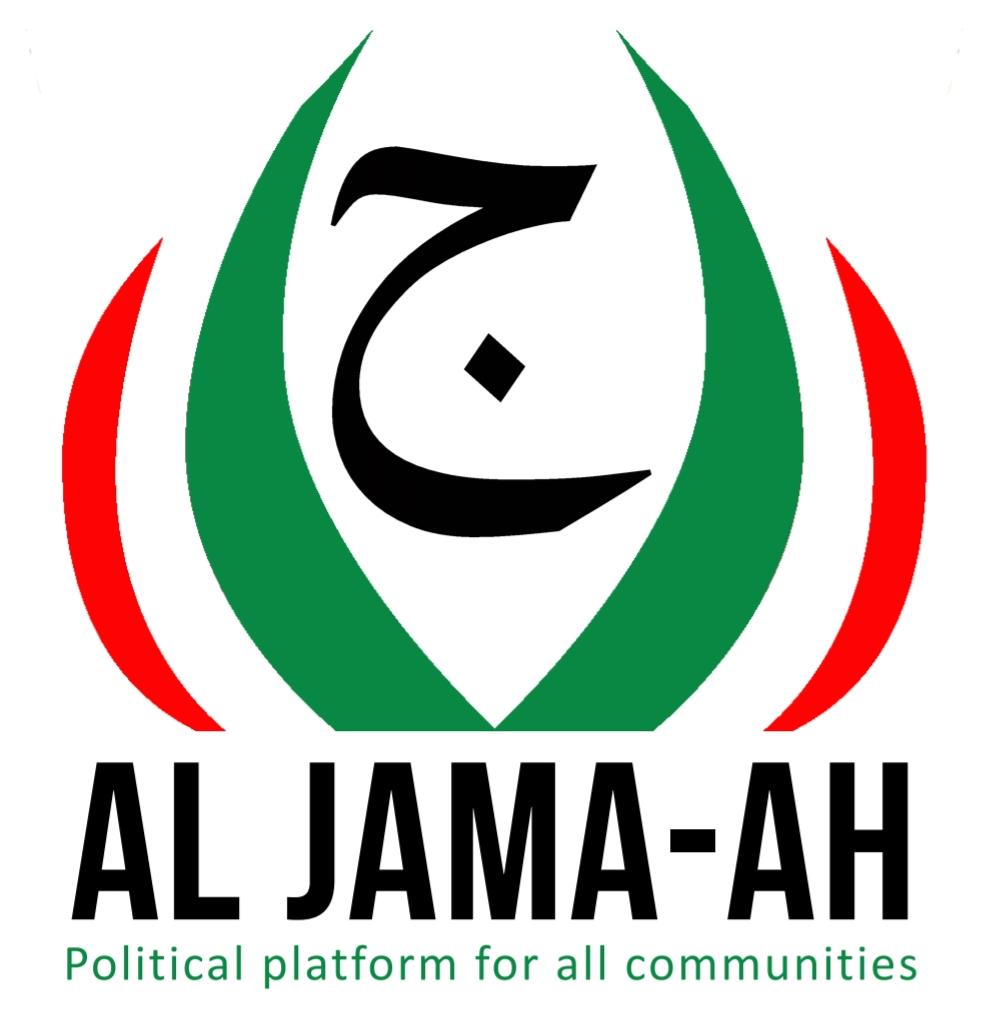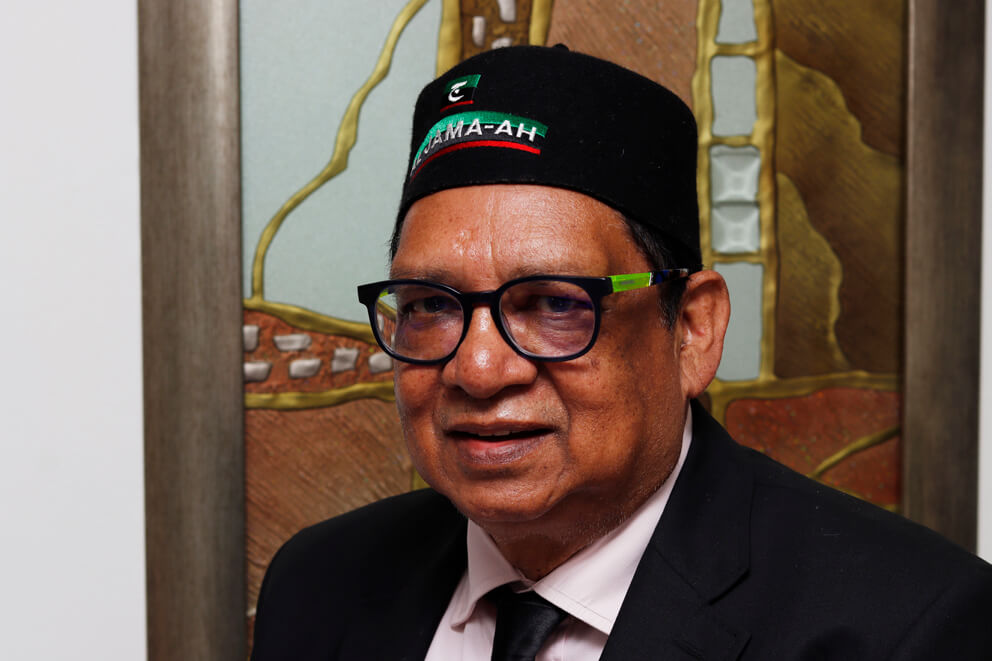Caption: Party leader | Ganief Hendricks
Hon. Mr. Ganief Hendricks, Al Jama-ah’s leader, spoke to the SABC, SA’s public broadcaster, during the time it conducted a series of election manifestos with political parties.
-
Introduction
Al Jama-ah, unlike other South African Muslim organizations, is a bona fide political party that contests local and national elections. But like these Muslim organizations, it subscribes to principles that are rooted in a divine legal system known as the Shari’ah. From a Muslim theological and juristic perspective, it is an eternal sacred system that is unquestionably unchangeable, and undisputable.
-
Shari’ah: An Unalterable Divine System
Shari’ah, it should be stated, is ‘an ideal path; that leads an individual to submit and worship God who is One and life’s ultimate source. For this reason, a Muslim (that is, the person who submits to God) perpetually advocates the concept of Tawhid (that is, God’s Oneness). Whenever he/she performs his/her daily thikr, each one reminds oneself of God; so, whatever he/she does, wherever he/she goes, and whenever he/she confronts challenges, God remains uppermost in that person’s mind.
The scholarly consensus is that Shari’ah’s origins are derived from its twin primary sources, namely the Qur’an (God’s revelation) and the Sunnah (Prophet’s practices/statements); while both these foundational structures are considered sacred, they have been open to various readings and interpretations since the prophetic period (circa 610-632); this continued to this day. On top of that, Shari’ah is regarded by all Muslims as an all-encompassing scheme; one that covers all human activities.
Now since all Muslims consider this a fixed immutable system, majority and minority Muslim communities have faithfully observed its principles in their private and public lives over the ages. Though the scholars (also referred to as ‘ulama that include theologians, jurists, and others) seldom questioned the Shari’ah – being their accepted and undeniable divine system – they passionately engaged with the foundational structures; this, however, depended upon their socio-political, economic, and cultural circumstances.
-
Fiqh: A Juristic Apparatus for Interpretation
In these situations, the ‘ulama made use of Fiqh (literally means: understanding); it consists of a set of jurisprudential tools that may be described as a particular juristic method used to reach human understanding of the divine system. Worded differently, Fiqh refers to the mujtahid’s – someone who applies his/her rational faculties to arrive at a juristic assessment – knowledge about past & present legal rulings; ones that were extracted from various (related) legal sources.
It is a system that thus aids the mujtihad (that is, the jurist who possess the skills and knowledge) and the Muslim community (that he/she serves) to gain a deep insight and perception of the socio-political scenario they are confronted with. Fiqh may be comprehended as a legal juristic apparatus within Shari’ah; one that helps to expand and develop it. This, moreover, takes place through an ijtihadi approach; one that employs rational interpretative principles to find ways of adjusting and applying them to the socio-political environment (such as South Africa).
The ‘ulama either invent/construct or find fatwas (that is, legal judgements/opinions) that may be applicable in the surroundings in which they find themselves. As the ‘ulama’s opinions increased and as differences appeared over time, schools of jurisprudence were established. During the earlier centuries and in the post-prophetic period, the Shafi’ite, Hanafite and other schools emerged.
The mentioned two became dominant in Southern Africa. Though scholars, who adhere to one of these schools, have invariably differed from their counterparts on juristic matters (such as an individual participating in secular system socially and politically as is the case within the South African dispensation), they generally agreed that Shari’ah remained unchallengeable.
At this point, it should be repeated that Fiqh, unlike Shari’ah, is fallible and changeable. One may further state that Fiqh is a flexible legal devise that provides an insight into the observance of rituals, application of morals, adherence to social legislation, and adaptation to political conditions within and outside the house of Islam. Since Fiqh assists in opening pathways in life in specific situations or in extraordinary circumstances without the individual’s faith being diminished or abandoned; nay, it, in fact, creates chances to affirm and strengthen one’s faith in God and in the community that the person serves.
-
Al Jama-ah on Shari’ah
Unfortunately, it seems that the SABC journalist, who posted online the summary of Hon Hendrick’s interview, gave an erroneous understanding of Al Jama-ah’s position vis-à-vis the Shari’ah. He and the Party’s members fully identify with this sacred system upholding it as a watertight, reliable system in their private and public lives. As far as records demonstrate, the Party never offered any other view that contradicts this stance.
Hon Hendricks, however, stressed that it is the Fiqh dimension that has been deliberately confused – probably out of ignorance – with the Shari’ah; as explained above, there are technical differences that do exist. Now, while Al Jama-ah and its members firmly subscribe and comply with Shari’ah, it is the set of Fiqh rulings within Shari’ah in general and the South African context, in particular, that guide the Party as well as all the Muslims who are South African citizens or residents. These they obtain from the recognized ‘ulama and bodies that have taken charge of these aspects of the community.
Being part of the Muslim community in South Africa, the Party, which publicly adheres to its Islamic ethos and principles without any state interference, accepts the country’s Constitution. It does so, even though it might have different understandings of some of the clauses that permit certain practices that are out of sync with Islam’s teachings. In fact, as a Muslim-oriented party, it argues that Islam’s teachings permit Muslims to show respect to the secular legal system and it encourage them to obey it despite clauses that may appear problematic when applied.
Anyhow it is important to state that Mr. Hendricks is aware of the challenges that the Party faces within the South African secular context; he knows that even though many Muslims do not support the Party and that it competes with others for Muslim votes, it is confident that this will change with the current election. During the past few years when it went to the polls, it was interesting that many of its supporters came from outside the Muslim community and this illustrates that others have confidence in the Party’s agenda.
In closing the issue, the Party turns to a debatable matter (that probably falls under Fiqh); it, along with a few other parties, stated that if it gets into power in Greater Cape Town, it intends to implement the contentious ‘expropriation of land without compensation in the post-local government elections. Now it is beyond question that certain members of the South African voting community would not want to see this happen, and they would most likely use their vote to counter the Party! Important is that the Party remains resilient and that it faithfully finds ways of wooing voters to see its bigger plans for our communities.
Aluta continua!


